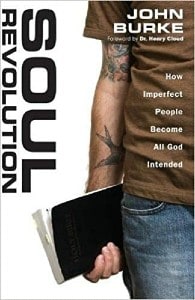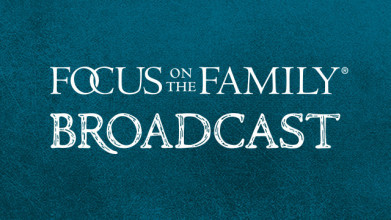Preview:
John Burke: A branch doesn’t have to work hard to produce fruit. All it has to do is stay connected to the trunk, the vine … And fruit happens naturally. I’m the vine, you’re the branches. Stay connected to me and you will bear much fruit. Apart from me, you can do nothing. That’s the whole point that I’m trying to get across in Soul Revolution. That actually all we have to do is learn to stay connected, moment by moment, to God’s spirit … And the rest of the things take care of themselves.
End of Preview
John Fuller: That’s John Burke, and he’s with us once again today on Focus on the Family. Your host is Focus President and author Jim Daly, and I’m John Fuller.
Jim Daly: John, I’m so excited to have John Burke back with us. Uh, he’s been here a number of times. But last time we talked about how we can trust God with our hopes and our dreams. And really, our deepest longings are found in Jesus. And when we can understand that it changes our life.
John: Mm-hmm.
Jim: And John, uh, gave us some ideas on reorienting our minds and connecting with God so that we can be in tune with the things, uh, he desires for us. The good gift giver, if I can-
John: Mm-hmm.
Jim: … say it that way. If you missed any part of it, man, get to the website, download it, uh, get the smartphone app. You can listen that way. But today we’re going to dive a little deeper into that content, uh, based on his book Soul Revolution.
John: And John Burke is the pastor and founder of Gateway Church in Austin, Texas. Uh, he and his wife Kathy have an adult son and an adult daughter. And his book Soul Revolution: How Imperfect People Became All God Intended is indeed, uh, the foundation for our conversation. Call us to get your copy: 800, the letter A, and the word FAMILY. Or stop by focusonthefamily.com/broadcast.
Jim: John, welcome back.
John B.: Oh, great to be back.
Jim: (laughs) It’s good to see you. Um, let’s pick up from last time. You talked about the 60/60 experiment. So for those that didn’t hear it, give us a quick briefing on what the 60/60 experiment’s all about.
John B.: Yeah, so the context, like we talked about last time, is that we all have deep longings, we have hopes, we have dreams. They’re not bad. But oftentimes, we settle for too little.
Jim: Mm-hmm.
John B.: And God actually wants to give us the deepest longings of our hearts, the love and the joy and the peace and patience and kindness. All these things that … things from out there can’t give us. But it only comes from intimate relationship with God. And in fact that’s what we are created for.
Jim: Yeah.
John B.: We weren’t created to do life apart from the very source of life and love and goodness.
Jim: Mm-hmm.
John B.: He created us for that. So, the Christian walk really is simple. It’s incredibly simple. And Jesus said this his last night on Earth, in John 15:5. He said, “Look. I’m the vine. Like, I’m the trunk of the tree. You know, the vine? Uh, you’re the branches. Stay connected to me, and you will bear much fruit. Apart from me, you can do nothing.” So the 60/60 Experiment is trying to help us reorient from the habit we all naturally fall into, which is that we go throughout our days forgetting that God is with us. He is with us. And he loves us. And he promised his Holy Spirit to be with us, to guide us into all truth. To guide us into the purpose he has us here for. And the result is the dreams and longings of our heart. We look back and, uh, personally, I can say I’m amazed.
Jim: Yeah.
John B.: And I would never choose any other path. Now, that doesn’t mean it’s not challenging sometimes along the way. Doesn’t mean there’s not disappointments. In fact, many times he uses the disappointments to rip away the things we’re using as props apart from God.
Jim: Mm-hmm. Yeah.
John B.: He’s not trying to harm us. He’s actually trying to help us.
Jim: Right.
John B.: Uh-
Jim: And he….
John B.: … so that’s … So the 60/60 is-
Jim: Yeah.
John B.: … every 60 minutes, for 60 days … You know, it takes time to set a new habit.
Jim: Sure.
John B.: So 60 days is a good time period to change a habit. So, for 60 days, you set a beeper to go off. Your alarm on your smartphone. Or we have an app that- that does it that’ll ding your phone and bring up a verse reminding you of how to stay connected, or what God wants in this relationship.
John B.: Maybe just put sticky notes in your car and on your computer, just as a reminder. And what you’re trying to do is change your habit from going through the hours of the day, the moments of the day, forgetting about God, who’s there with you.
Jim: Or distracted.
John B.: Or distracted.
Jim: Yeah.
John B.: Or not listening.
Jim: Right.
John B.: And responding.
Jim: John, let me ask you this. As a pastor, I’m sure you have counseled many, many people that fit this description. But I want to really speak to that person that this is true of. And that is the person that’s trying to satisfy longings that are artificial. Uh, it might be success, money, houses, cars, relationship, you know. The beautiful wife, whatever. And how, when they reach it, how, uh, it doesn’t meet the need. And speak to that individual. And even in the church. You know, someone who’s made a commitment to Christ. It’s sometimes hard to shake those habits of what you’re actually going after. And how to get better oriented around exactly what you’re saying: opening your heart so the Lord can help meet the deeper longings of your life. I mean, some people might not even know what those longings are. That’s how distracted they can be.
John B.: Yeah, and I think the other part is, um, we don’t stay connected to the Lord because we fear that if I do, he’s going to fill in the blank.
Jim: Huh.
John B.: So, this is my old fear, right? I was an engineer. Um, I had a- a dream and a goal to start my own, get an MBA, start my own company, be rich and successful. ‘Cause that was I trained is success.
Jim: Sure.
John B.: Okay? Well, then my dad did that, but it killed him.
Jim: Huh.
John B.: He died. He died from cancer, but he also struggled with alcoholism-
Jim: Just overworked.
John B.: … he struggled with stress, he had ulcers, he … And on his deathbed, he said to me, “John, I’d give it all back if I could just have my health and my family.”
Jim: Hm.
John B.: He knew the Lord, but he didn’t know how to walk with the Lord.
Jim: Abide in him.
John B.: He didn’t know how to abide. How to stay connected. And as a result, there were a lot of wounds. Um, you know, his father abandoned their family. He was abusive. There was just a lot of wounds from the past my dad had never worked through. And I mean, I didn’t realize this. And this is the thing: our deepest longings are really trying to answer a few questions. Am I lovable? Or am I loved? And do I have worth? Do I have value?
Jim: Hm.
John B.: Do I have purpose? And really, we’re trying to get those questions answered. The shallow strategies oftentimes are like, we’re trained, or we come up with an idea that if I’m successful. If I have a husband who looks like this, or does this, or is this status. Or if I have a wife who, you know, looks like this or kids. Or, you know, no, you can fill it in with a thousand things.
Jim: Sure.
John B.: Um, but those end up suddenly becoming idols. In other words, they become the singular most important thing, and they distract us, just like you were saying, from the one thing that Jesus said is necessary. Right. And that is, relationship with the Lord. Walking moment by moment with the Lord.
Jim: Yeah.
John B.: And so it- I- I think the thing I would say is, don’t worry about changing all your dreams. They’re bad, or your hopes are bad; they’re not, necessarily.
Jim: Right.
John B.: At all. Focus on walking day by day for 60 days. And just see if you don’t end up going, “Oh my gosh, this way of doing life with God is so much better.”
John: Yeah.
Jim: You had a story in the book about going skiing with your college buddies.
John B.: (laughs)
Jim: And you encountered, uh, what sounded like a- you know, ski bunnies.
John B.: (laughs)
Jim: What happened in that story? And what was the outcome?
John B.: Yeah. So-
Jim: What state were you in? Colorado?
John B.: Colorado.
Jim: Okay, good.
John B.: Crested Butte.
Jim: Okay.
John B.: To be specific.
Jim: Yeah, excellent.
John B.: Yeah.
Jim: Great ski spot.
John B.: Yeah, it’s a great ski spot. And, uh, yeah, so we were single, college, me- met these three girls, and you know, we were trying to show off and-
Jim: Texans.
John B.: Yeah, and Texans.
Jim: (laughs)
John B.: And, uh, if you don’t know, Coloradans have a love-hate relationship with Texans.
Jim: Hm. (laughs) But they love Texans who can ski really well.
John B.: They love.
John B.: Yeah, and so I mean, but these girls were like, leading us into the trap, right?
Jim: Ok.
John B.: And they were like, “Okay, you can ski? Let’s go skiing.” So they take us up to the back side. And it’s this big, bowl, probably two feet of powder, three feet of powder.
Jim: Crazy.
John B.: 70 degrees, I mean, it was … it looked like a straight-down drop. So they said to me, “You can’t fear. You just have to- you have to go like you’re falling down the mountain plunge, and then use the speed to control your speed.” So I start, and I’m terrified. So I lean back. Well, that’s the worst thing you can do.
Jim: Yeah, boom. (laughs)
John B.: And … I- I- you know, I snowball for 200 yards.
Jim: Yeah.
John B.: She comes back and she’s like, “No.”
Jim: (laughs)
John B.: “If you give in to fear, you’re not going to be able to, you’re not going to be able to do this. You have to, like, throw yourself down the mountain. And then you’ll be able to control your speed.” It seemed counterintuitive.
Jim: Right. I’d be right with you.
John B.: But I did it.
Jim: Yeah.
John B.: I did it that time. I leaned down. I leaned down the mountain, and I didn’t fight the speed. And I started to then turn, and it was the most fun I’ve ever had. It was a thrill.
Jim: Mm.
John B.: The 60/60 Experiment, doing life moment by moment with Jesus, is the same. So here’s what I challenge people to do. For 60 days, you have to go all out in complete willingness-
Jim: To lean in.
John B.: To do his will.
Jim: Yeah.
John B.: But I’m telling you, after watching thousands of people do this experiment for 60 days, nobody ever says, who- who goes all out, “Oh, I wish I hadn’t done that.”
John: Hm.
John B.: Nobody. It’s always-
Jim: Well, that’s a good guarantee.
John B.: Always, “Oh, my gosh.”
Jim: Yeah.
John B.: God is real. He loves me and cares about me. I couldn’t believe the things I experienced the way God showed up, the way he led me, the joy, the peace. A- and the way he takes care of the little things-
Jim: Yeah.
John B.: … when I just focus on the one thing Jesus said is most important: abide in me, you’ll bear much fruit. Apart from me, nothing.
Jim: John, that is so good. Uh, in the book, you share how you responded at a crucial time when a friend of yours, Jerry, really needed you. How did that work in that situation?
John B.: Well, it wasn’t- it wasn’t reconciliation. It’s a good … Uh, this story is a good reminder. So we have to learn to listen to these little promptings. So that’s what happened with Jerry. I’m sitting there doing emails one day. And, um, … Oh, no, actually, I was working on a message. And I was on a deadline. And I had this thought go into my head, “I wonder where Jerry is?” Jerry was not a Christian. He and his girlfriend had started coming to our church. And I hadn’t seen him in a while. And I didn’t know why I had that thought.
Jim: Oh.
John B.: And I thought, “Why did I think that?” Well, and then I was like, “I’m busy.” I got, and so I go back to writing my message, and I had the thought again.
Jim: Mm-hmm.
John B.: And it was kind of like, “Email Jerry.” It was like, “I don’t- I don’t even know if I had Jerry’s email, and I don’t have time to do this. But I’ll email Jerry.” So I emailed Jerry. “Hey Jerry, I haven’t seen you in a while. Hope you’re okay. Just was thinking about you. Stopped and prayed for you. Let me know if I can do anything for you.” Shot it off. Well, the next day, his girlfriend, um, who Jerry lived with, got that. And she had just taken him home from the hospital, having tried to commit suicide the day I wrote that email.
Jim: Mm-hmm. The day the Lord was nudging you.
John B.: The day the Lord nudged me.
Jim: Yeah. Amazing.
John B.: She said, “As an act of God, they came in and he unloaded all the guilt and burden that he’s carried.” Because basically, he- he started dating his brother’s girlfriend that tore their relationship apart, ’cause his brother was in love. And- and he felt incredible guilt. And it just drove him, and he didn’t know the forgiveness of the Lord.
Jim: Right.
John B.: So I shared the Gospel with him. He came to Christ.
John: Huh.
John B.: The Lord turned his life around. It was amazing. Because of one little prompting thought.
Jim: Yeah. Think of that.
John B.: And that’s the adventure we get to go on with the Lord.
Jim: Mm.
John: Well, we’re inviting you to go on a journey with God, and to be used by him, as John was just describing. Um, the book that we’re talking about today on Focus on the Family is written by John Burke. It’s called Soul Revolution: How Imperfect People Become All God Intended. And, uh, we’re making that available to you. Just give us a call, 800, the letter A, and the word FAMILY. Or stop by focusonthefamily.com/broadcast.
Jim: John, that can be one of the big barriers, is moving toward people with the right attitude. You’re in the 60/60 Experiment, you’re asking the Lord every 60 minutes, “Okay Lord, what- checkin’ in. Where do I need to go?” And boom, that thought hits you. Contact So-and-So. Okay, well, I’m not sure if that’s the Lord, but in faith, I’m gonna make that happen. And, you know, these can be relationships that have historic conflict in them.
John B.: Mm-hmm.
Jim: Or something. So kind of bundling those thoughts together, uh, the concept of moving toward people … for some-
John B.: Oh, yeah.
Jim: … can be really intimidating.
John B.: Well, it can be past conflict, or it can be present conflict.
Jim: Or just fear.
John B.: Yeah. And one of the things, um, in the book I- I talk about, um, using The Lord’s Prayer as a model.
Jim: Yeah, let’s talk about that.
John B.: Uh, well, and it leads in … Because again, it’s not being formal. It’s just really … The Lord’s Prayer is a really a- a model. “Our Father, who art in Heaven, holy is your name.” In other words, you’re greater than I can possibly imagine. Better than I can possibly imagine. I’m gonna trust you. That’s that- the sentiment. And then the second, you know, your kingdom come, your will be done, on Earth as it is in Heaven. Okay, that’s a prayer. Now Jesus taught us to pray that because God’s will is not done mostly on Earth. Uh, this is what we’re trying to do in the 60/60 Experiment.
Jim: Hm.
John B.: Is change it from the way we typically will things to be done and allow God’s will to actually work in us. Now, here’s the thing. Love requires willingness and free will. So God doesn’t force himself on us. Many times, he waits for our willingness. And so, the responding in obedience, the radical response, in those moments throughout the day, it does require humbling ourselves in trust. I think about my own personal experience. When our kids were little, we were in the middle as a- church, of doing the 60/60 Experiments. My watch was going off, you know, beeping every- every 60 minutes to remind me to stay connected each- each moment of the day. We go down to the beach, and, um, the kids are little, we stay up late swimming. Uh, w- we get up the next morning, and I had this plan in my head of how the day was going to go. We had to get back; it was Sunday. So we would get up, you know, get ready, we’d be out on the beach by 10. We would enjoy, you know, the afternoon. We’d hit the road by- by two, because we had to get back and ready f- for school and everything else. And it’s 10 o’clock, 11 o’clock, 12 o’clock …
Jim: (laughs)
John B.: You know, we’re all grumpy because we didn’t sleep well. We’re in a cramped little hotel. The dog, and dog’s barking, kept us up all night. We’re all getting on each other’s nerves. But I was doing a really good job of being patient.
Jim: (laughs) Let me tell you.
John B.: (laughs) And my wife disagrees, but she’s wrong. (laughs)
John: Oh man am I feeling this.
Jim: (laughs)
John B.: So you get the picture, right?
Jim: Yes.
John B.: But I really felt like I had. Like, we were all getting on each other’s nerves. The kids were crying and upset, and I was trying to be so patient. Like-
Jim: Yeah.
John B.: But now it’s noon. It’s two hours past plan. (laughs)
Jim: Right. Time to go.
John B.: I.e., my will.
Jim: Yeah.
John B.: Be done. So anyway, um, my wife finally confronted me. She said, “You’re being so impatient.” Well I was like, “What? Don’t you realize how patient I’ve been for two hours?”
Jim: (laughs) “You’ve not noticed?”
John B.: Yes. (laughs)
John: (laughs)
John B.: And, uh, and it just, you know … So then we started getting in, and we were all-
Jim: Yeah.
John B.: And right as we’re in the middle of it, what do you think happened? The stinkin’ beeper goes off on my watch!
Jim: (laughs) The 60/60.
John B.: The 60/60. And I’m not kidding. In my mind I said, “Sorry Lord, can’t connect right now. I’m busy.”
John: Yeah, not this time. (laughs)
John B.: (laughs)
Jim: And I certainly don’t want accountability. (laughs)
John B.: I do not want … and- and that is exactly what happens, right?
Jim: Yeah.
John B.: And what … I realize is in that moment, it was, like, my wound, my pride, my way … It was blocking my spirit from even wanting to consider what the Lord wanted.
Jim: Mm-hmm.
John B.: His will be done. Right?
Jim: Yeah.
John B.: And I literally had to … A- and it was only because this verse from Scripture kept coming to my mind. Again, I think it was the words prompting. “God opposes the proud. But he gives grace to the humble. Humble yourselves, therefore, under God’s mighty hand, and he will lift you up.”
Jim: Yeah.
John B.: I kept hearing that, and I was like, “Oh, I never shoulda never memorized that Scripture.”
Jim: (laughs)
John B.: (laughs)
Jim: They always come back to bite us.
John B.: Yeah.
Jim: (laughs)
John B.: But I went for a walk, and I just calmed down, and- and I was able to say … And sometimes this is what you have to say. “Lord, I can’t do it for them. But I’ll do it for you.”
Jim: Mm. That’s good.
John B.: That’s obedience. That’s abide in my love, and how do you abide in my love? You know how much God loves us. A depth that we cannot fathom how high, how low, how wide, how deep. But we only have one thing to offer him in love: our will. In any one moment.
Jim: Mm-hmm.
John B.: So I said, “Okay. I’ll do it as an act of love for you.” And I went back, and I apologized, even though I wasn’t wrong; they were wrong.
Jim: Yeah. (laughs)
John B.: (laughs)
Jim: I can see it went deep. (laughs)
John B.: (laughs) Still gotta go through forgiveness.
Jim: Right.
John B.: No, but that is the reality.
Jim: Yeah.
John B.: So that’s your kingdom come; your will be done. And what we’re doing in these moments, throughout the day in the 60/60 is we’re changing our habit.
John: Yeah.
John B.: Of just letting our pride and our will be done, and we’re- we’re actually following his- and we’re seeing it’s better. It was better. We went out and had a great day the rest of the day.
John: So you did have resolution.
John B.: They apologized, too, once I led.
John: Hm.
John B.: But leadership often requires humbling yourself, right?
Jim: You know, and I think in that 60/60 Experiment, one of the things is just getting to know the voice of the Lord. Um, a- and it doesn’t need to be a shameful thing or an embarrassing thing.
John B.: No.
Jim: If you haven’t practiced this. I- it takes a little time to say, “Okay, is that just me thinking that? Or is it really the Holy Spirit nudging me?”
John B.: Yeah.
Jim: In fact, you had a story in the book about Kathy. You guys, I think, were in Russia.
John B.: Oh, yeah.
Jim: And something at a nice restaurant occurred or something.
John B.: Yeah.
Jim: So fill in the blanks.
John B.: We were living in post-Communist Russia. So, uh, it was right after the fall of the Soviet Union. Uh, we moved to Leningrad, we left St. Petersburg, same city. We were there when it-
Jim: Yep.
John B.: … when it changed.
Jim: When it changed names. Yeah.
John B.: But during that time it was hyperinflation. Um, just horrible economic crash.
Jim: Yeah.
John B.: So, anyway, um, we were at a Christmas break out in Switzerland, uh, for a conference. So, we’re having this- we go to this really nice restaurant, steakhouse in Switzerland. Just lovin’ it. And my wife couldn’t eat. She has a huge mercy gift.
Jim: Right.
John B.: That’s not my problem. (laughs)
Jim: Right. (laughs) You married opposites.
John B.: (laughs) Yes. She helps me. She helps me with the Lord’s heart for people. And, uh, and so she couldn’t eat. And I’m like, “Why aren’t you eating?” And she goes, “I just- I can’t eat this beautiful meal, knowing some of our Russian friends, the parents and married student housing can’t even get milk for their kids. We gotta do something to help them.”
Jim: Mm.
John B.: And so we stopped, and we prayed around the meal. We just said, “Lord, if this prompting that Kathy’s feeling, we’re all feeling.” We were all …
Jim: Right.
John B.: Like, “God, are we supposed to do something? Then tell us. Show us.”
Jim: Yeah.
John B.: And we spent the rest of the night brainstorming. “Well, maybe we could find trucks in Finland, and we could truck food in from Finland. We can raise money from churches in the United States.” We started to develop this plan. Well, we get back that next week, to our flat; we lived in a Russian flat apartment; and, um, there was a- a phone message waiting for us. And we call. And … It was an organization that had a C-110 military transport plane flying in a whole cargo load of food, enough to feed 2,000 families for three months. Their contact had turned out to be Mafia. They heard we were Americans living there. Is there any way we could possibly help them distribute the food?
Jim: Huh … (laughs) That’s crazy. Crazy!
John B.: Crazy.
John: My goodness.
John B.: And so we ended up being able to not only, you know, meet the needs physically, but, um, we were able to share Christ with all of them and tell them about the God who cares about their needs, physical and spiritual. It was amazing. But again, this is the adventure God wants to lead us on. And sometimes it’s amazing like that. Like, he wants to do something through us, but we have to be willing to just seek his will.
Jim: Yeah.
John B.: And be willing to act. Sometimes it’s real simple.
Jim: Yeah, and I- I like that, through both days you talked about that: keeping things simple, that the Gospel is simple. Um- It’s not easy.
John B.: No.
Jim: But it is the hardest thing-
John B.: (laughs) It is the hardest thing.
Jim: But really, it’s simple.
John B.: That’s why the 60/60 Experiment is for 60 days. We’re trying to reorient our habit-
Jim: Right.
John B.: … of not doing this one thing Jesus said is necessary.
Jim: Yeah.
John B.: Getting distracted by everything else.
Jim: Everything else. And I think that’s where I want to end with this last question: that person, maybe they don’t even feel worthy. That’s so much the guilt that the enemy lays on our heart, that, you know, we- we couldn’t possibly be noticed by God because we’re so unworthy.
John B.: Yeah.
Jim: Think of the things that you’ve done, and the way that you’ve acted and the thoughts that you’ve had.
John B.: Right.
Jim: I’m trying to hit all the checklists we have.
John B.: Or still have.
Jim: Or still have.
John B.: Struggle with.
Jim: But the Lord’s good with all that. He just wants that relationship, and those things will take care of themselves when you stay grafted into the vine.
John B.: Absolutely.
Jim: That’s the point.
Jim: And so speak to that person that continually has that loop playing in their head. And they don’t know that they can get out of the rut.
John B.: That’s a lie from the enemy of your soul trying to keep you in the trap he’s got you in. Which is if, and I … You know, I’ve struggled with my own, uh, sin patterns and even addictions in my past.
Jim: Mm-hmm.
John B.: As I was coming to faith in Christ. And I remember that. I remember what would happen as I would- I would want to do well. And I would try, and then I would fail. And then I would hear in my head, “Man, you’re disgusting. God is so … he’s so displeased in you; he doesn’t want to hear from you until you can clean up your act.”
Jim: (laughs) Right.
John B.: So you know what I’d do? I’d stay away from God. The only one who as I abide can produce the freedom in my life.
Jim: Right.
John B.: So you see, the- the irony is when we try to do it without God, we stay stuck.
Jim: Right.
John B.: And that is the evil one’s intent. He lies to you about that. So if you’re feeling that, memorize what I memorized: Romans 8:1. “There is now no condemnation for those who are in Christ Jesus.” Right?
Jim: That’s pretty straightforward.
John B.: No condemnation. So if- if you fall, if you do wrong, you know, just like in The Lord’s Prayer. You know, he says, “Forgive us our sins and we forgive others.” He already has paid for it. Jesus already saw and paid for that sin 2,000 years ago. Which means he already knows the ones you haven’t even done yet.
Jim: Mm-hmm.
John B.: And he paid for those, too. And why did he do that? Not so we’ll keep doing it. So that we won’t stay disconnected from the very source of love and life, and the meeting of our deepest longings, and then leading us on this healing journey. This adventure of life. There’s nothing better. And all you have to do is stay focused on one thing: stay connected to him; the fruit happens naturally.
Jim: Yeah. And that is so good. And John, what a place to end. That’s the challenge. I’d say, take it, do the 60/60 Experiment. Get a copy of the book, Soul Revolution. Get it right here from Focus, because all the dollars go right back into ministry. So that’s helpful; we’re not paying shareholders. And, uh, and why not take the challenge? If you want that deeper relationship with the Lord. Or maybe you don’t have that relationship with the Lord. Call us, talk to a Christian counselor here at Focus on the Family. They will walk you through that, and help you better understand what it means to be committed to Christ. And John, this has been so good. I hope, literally, we’re probably talking to three-four million people the last couple of days. I hope a lot of ’em will take the challenge, especially if they haven’t lived in that abiding that you’ve talked about.
John B.: Yeah, and I would say if you’ve never gone all out for 60 days trying it, I can just guarantee at the end of that 60 days, you’ll go, “This is the best thing I’ve ever done.”
Jim: Right. And I’d love to hear those stories. You know, when those things happen. Man, shoot us a note, let us know how God is speaking to your heart-
John B.: Mm-hmm.
Jim: … in that 60-day trial and beyond.
John: Well, this is a grand invitation to a great journey. And we invite you to get in touch with us. To get a copy of John’s book, Soul Revolution, our number is 800, the letter A, and the word FAMILY. 800-232-6459. Or stop by focusonthefamily.com/broadcast. And this reminder that we’re a listener-supported ministry, and your donation will help us become even more effective at reaching literally around the world and encouraging families. Uh, donate today a- a gift of any amount, and we’ll say “Thank you” by sending a copy of John Burke’s excellent book, Soul Revolution. You can do that when you call us or stop by the website. On behalf of Jim Daly and the entire team, thanks for joining us today for Focus on the Family. I’m John Fuller, inviting you back as we once again help you and your family thrive in Christ.





















